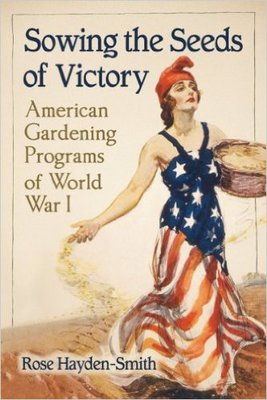 Sowing the Seeds of Victory: American Gardening Programs of World War I by Rose Hayden-Smith is one of the few books on the topic of wartime gardening that scarcely mentions World War Two. The focus on gardening and horticultural movements prior to and during the First World War is a welcome addition to the small but growing pantheon of food history books from that era. Hayden-Smith, although a historian, is also a sustainable gardening advocate and it shows in this book - a little too much for my taste. Hayden-Smith uses the history of World War I war gardens as justification and inspiration for modern gardening movements, using period primary source material as evidence. If you are new to the ideas surrounding the modern sustainable agriculture and community gardening movement, you might find this interesting, but as someone who has followed said movement since high school, I found the constant references and asides to the modern era annoying and unnecessary. I would have vastly preferred if Hayden-Smith had made her connections between past and present at the end of each chapter, rather than interrupting the flow of the historical with the modern. Modern gardening aside, Hayden-Smith covers the World War I gardening movement by taking in-depth looks at Charles Lathrop Pack and the National War Garden Commission, the United States School Garden Army, the Pennsylvania School of Horticulture for Women, and the Woman's Land Army of America. Although the Woman's Land Army of America has been admirably covered in-depth by Elaine Weiss's Fruits of Victory, the other three topics have been little-studied and Hayden-Smith has done an admirable job of digging through obscure archives and has brought to light new resources from California (where she lives). Another chapter outlines the propaganda work of the war garden and food conservation movements and a final chapter takes a quick look at gardening in the Interwar to Post-War years in the United States. The book concludes with a summation of the war garden movement throughout the decades following and a call to action and advocacy for modern community gardening efforts. The best chapter is on the Pennsylvania School of Horticulture for Women - it is well-researched, interesting, and provides new insights into the origins of both the Woman's Land Army of America and Cornell University's cooperative extension home economics program, headed by Martha Van Renssalaer - a graduate of the horticulture school. Although the information is fascinating in the other chapters, they are somewhat poorly organized. For instance, in the chapter on the National War Garden Commission, Hayden-Smith references Charles Lathrop Pack numerous times, but doesn't introduce his background or any biographical information until halfway through the chapter (the chapter begins on page 32; Pack is finally "introduced" on page 48). In addition, perhaps at the behest of the publisher, there are constant parenthetical asides that in other books would have been asterisked footnotes, or simply incorporated into the text. Parenthetical asides pointing out obvious connections between the source material and modern food and gardening movements were especially annoying. It was a frustrating read - I could see and feel the potential for a truly excellent book, but was stymied every time a statement was followed by another saying the exact same thing, information was unnecessarily put in a parenthetical aside, or information was written in an order that made little sense. Frankly, the book was in serious need of a good editor (not a copy editor, although I did also find a few typos) - someone to give advice on how to organize the arguments and the best order for the book. Because although each topic/chapter was interesting in and of itself, there was also little to tie all four topics to each other. I would be interested to know if the book had been peer-reviewed before publication. In all, I would recommend it to anyone interested in the food and/or gardening history of World War I, but don't expect an easy read. If you would like to purchase Sowing the Seeds of Victory through this link, I will receive a small commission.
4 Comments
4/20/2019 11:16:23 am
I really enjoy reading people's reviews on food and stuff. In my opinion, understanding the different opinions that people have is a fascinating thing to do. Personally, I try to suggest what I find good and what I find bad about something that I review. I really hope that my suggestions meant something to people, I really work hard on writing most of what is in my blogs. I am really happy to have read this food review of yours.
Reply
12/14/2020 12:37:50 am
I am reading about this programme which was held in USA and it is very interesting for the farmers to sow their seeds
Reply
Your comment will be posted after it is approved.
Leave a Reply. |
AuthorSarah Wassberg Johnson has an MA in Public History from the University at Albany and studies early 20th century food history. Archives
July 2024
Categories
All
|

 RSS Feed
RSS Feed